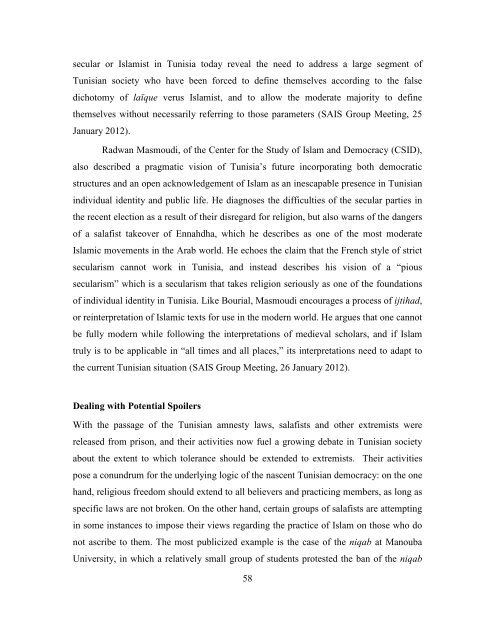Tunisia: Understanding Conflict 2012 - Johns Hopkins School of ...
Tunisia: Understanding Conflict 2012 - Johns Hopkins School of ...
Tunisia: Understanding Conflict 2012 - Johns Hopkins School of ...
Create successful ePaper yourself
Turn your PDF publications into a flip-book with our unique Google optimized e-Paper software.
secular or Islamist in <strong>Tunisia</strong> today reveal the need to address a large segment <strong>of</strong><br />
<strong>Tunisia</strong>n society who have been forced to define themselves according to the false<br />
dichotomy <strong>of</strong> laïque verus Islamist, and to allow the moderate majority to define<br />
themselves without necessarily referring to those parameters (SAIS Group Meeting, 25<br />
January <strong>2012</strong>).<br />
Radwan Masmoudi, <strong>of</strong> the Center for the Study <strong>of</strong> Islam and Democracy (CSID),<br />
also described a pragmatic vision <strong>of</strong> <strong>Tunisia</strong>’s future incorporating both democratic<br />
structures and an open acknowledgement <strong>of</strong> Islam as an inescapable presence in <strong>Tunisia</strong>n<br />
individual identity and public life. He diagnoses the difficulties <strong>of</strong> the secular parties in<br />
the recent election as a result <strong>of</strong> their disregard for religion, but also warns <strong>of</strong> the dangers<br />
<strong>of</strong> a salafist takeover <strong>of</strong> Ennahdha, which he describes as one <strong>of</strong> the most moderate<br />
Islamic movements in the Arab world. He echoes the claim that the French style <strong>of</strong> strict<br />
secularism cannot work in <strong>Tunisia</strong>, and instead describes his vision <strong>of</strong> a “pious<br />
secularism” which is a secularism that takes religion seriously as one <strong>of</strong> the foundations<br />
<strong>of</strong> individual identity in <strong>Tunisia</strong>. Like Bourial, Masmoudi encourages a process <strong>of</strong> ijtihad,<br />
or reinterpretation <strong>of</strong> Islamic texts for use in the modern world. He argues that one cannot<br />
be fully modern while following the interpretations <strong>of</strong> medieval scholars, and if Islam<br />
truly is to be applicable in “all times and all places,” its interpretations need to adapt to<br />
the current <strong>Tunisia</strong>n situation (SAIS Group Meeting, 26 January <strong>2012</strong>).<br />
Dealing with Potential Spoilers<br />
With the passage <strong>of</strong> the <strong>Tunisia</strong>n amnesty laws, salafists and other extremists were<br />
released from prison, and their activities now fuel a growing debate in <strong>Tunisia</strong>n society<br />
about the extent to which tolerance should be extended to extremists. Their activities<br />
pose a conundrum for the underlying logic <strong>of</strong> the nascent <strong>Tunisia</strong>n democracy: on the one<br />
hand, religious freedom should extend to all believers and practicing members, as long as<br />
specific laws are not broken. On the other hand, certain groups <strong>of</strong> salafists are attempting<br />
in some instances to impose their views regarding the practice <strong>of</strong> Islam on those who do<br />
not ascribe to them. The most publicized example is the case <strong>of</strong> the niqab at Manouba<br />
University, in which a relatively small group <strong>of</strong> students protested the ban <strong>of</strong> the niqab<br />
58
















